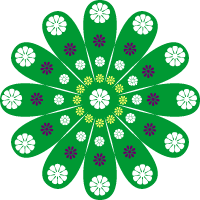PASHTUNWALI
Pashtunwali is conservative, oligarchic, centuries old but still a young phenomenon in the Pashtun culture and socio-economic structure. It has been able to maintain a powerful dialectical balance of the Pashtun society. Pashtunwali, a complement of the Pashtun society, has undergone various legal, political, economic and cultural changes for its reform. It has developed into an accepted constitution.
This system has managed all social and internal affairs of the Pashtun/Pakhtun society before and after Islam. It has created small and large local governments in Central and South Asia. Pashtunwali embodies all the principles of a self-sufficient social group. Its two principles of Siali (Competition) and Mailmastia (Hospitality) embody two social principles that ensure a society’s progress through competition; and survival through co-operation. The elements of conflict and co-operation are evenly balanced in the make-up of Pashtunwali. Concepts like Nang (honour), Siali (competition) and Badal(retribution) are open to interpretation, as the social needs and the collective perception of the group change with time.
Pashtunwali codes are extensive. Some codes of conduct include:
Faith - trust in God (known as "Allah" in Arabic and "Khudai" in Pashto). The notion of trusting in the one creator generally comports to Islamic idea of belief in only one god (tawheed).
Behaviour - Pashtuns must behave respectfully towards all creations including people, animals and the environment around them. Pollution of the environment and/or its destruction is against the Pashtunwali.
Unity - above the languages they speak, above the blood they keep, above the amount of money they make, Pashtunwali unites the Pashtuns as one people across the world. Where there's true unity, every effort to disunite them will only serve to strengthen the unity they have. What happens to one - happens to all.
Equality - Every man is equal. It's this concept which has necessitated the development amongst Pashtuns of a Jirga system, whereby decision making takes place with the participation of all members of the Pashtun society. Every man wants a say in his future and he will fight for his right to have his opinions heard. All people must therefore deal with each other, with the proper civility or respect and no one may impose their will on to another.
Hospitality and sanctuary - Being hospitable to all mankind, especially to guests, even the most hostile of enemies may (if asked for) be provided sanctuary, asylum or protection as well as food and other aid.
Honour - Pashtuns must maintain their independence and human dignity. Honour has great importance in Pushtun society and most other edicts and codes of life are aimed towards the preservation of one's honour or pride.
Compassion and cooperation - The poor, the weak, and the challenged must be supported. Inclusion must be preferred to exclusion. To defend against tyranny, fascism and overzealous groups and to work smart first and then hard.
Pashtun history - Great value is placed in Pashtun history, with all its depth and pluralism, tragedies and victories. It teaches Pashtuns "to keep the mind open, to continue the search for the truth, much of which has vanished under history itself".
Other Pashtunwali concepts include:
Lashkar - the tribal army. It implements the decisions of the jirga.
Jirga or Loya Jurga - an assembly of tribal elders called for various purposes whether waging war or composing peace, tribal or inter-tribal.
Tsalweshti (څلويښتی) - derived from the word for forty, this refers to the tribal force that would implement the decision of a jirga. Every fortieth man of the tribe would be a member. A shalgoon is a force derived from the number twenty.
Badragga - a tribal escort composed of members of that tribe through which the travelers are passing. If abadragga is violated a tribal feud will follow.
Hamsaya - a non-Pashtun dependent group who attaches themselves to a Pashtun group, usually for protection. The Pashtun protector group is called a naik. Any attack on a hamsaya is considered an attack on the protector.
Mlatar (ملاتړ) - literally, tying the back or "support". This refers to those members of the tribe who will actually fight on behalf of their leaders.
Nagha - a tribal fine decided by the council of elders and imposed upon the wrongdoer.
Rogha - settlement of a dispute between warring factions.
Hujra - a common sitting or sleeping place for males in the village. Visitors and unmarried young men sleep in the hujra.
Lokhay Warkawal - Literally means 'giving of pot'. The idea that the tribe will do everything to protect an individual from an enemy.

Home Who are the Pashtuns? Get involved Events Media Resources Donate Contact us Sitemap Terms & Conditions Privacy Policy |